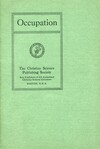

Are you sure?
This bookmark will be removed from all folders and any saved notes will be permanently removed.
Arise
IN these days of rapid change, amid the restlessness of peoples all the world over, one has hardly time, supposedly, to pause, so great seems to be the endeavor for a man to attain the height of his ambition—it matters not in what direction that ambition lies. In spite, however, of seeming human limitations, there is always hope for the active man. He is bent upon exerting every energy to reach that height which he has set out to attain. Notwithstanding all obstacles, and however good it may seem to him from the base upon which he started, it must of necessity be insufficient to satisfy him if that premise be human. All the pleasure and joy of human sense testimony may be brought to bear upon this career; he may reach the goal where he has abundant possessions and wealth; yet he is not satisfied with his achievement. This being so, he pauses to think of the absence of happiness,—why with this abundance he is not content,—what it is that he lacks. Perhaps his thought has been arrested by a present day Paul, who has seen how idolatrous has been his concept and perchance brought to his remembrance the saying of Paul to the Athenians: "Whom therefore ye ignorantly worship, him declare I unto you." Whatever it may be, he has nevertheless found the opportunity to turn his activity in the opposite direction from his idolatry, to set his affections "on things above,"—to arise. He is earnestly attracted to he higher meaning of life and living and its achievement.
Perchance a man may have attained the position where, in a life of humanly intelligent activity, at the very zenith of his success, sudden calamity overtakes him, and he is deprived in belief of one of his active faculties—perhaps of the very one he considers the most useful and needful. He is curtailed in his endeavors and forced to depend on others. Being deprived of the ability, humanly speaking, to do for himself that which he always has accomplished alone, he now meditates upon his dependence on others. Here again he discovers that the capacity to think is ever present. He ponders, examines himself, and in his self-analysis honestly seeks the remedy. With opening vision such a one finds the hope within that is bound to rise above the bondage of human sense, discovers the cause of right activity, and commences the ascent in thought which leads above the mists to the sunlight that purifies and invigorates. So pregnant with meaning is this small word "Arise," that he flings away his false concept of ambition and replaces it with the true, the real effort to attain the salvation which is from on high.
The lack of satisfaction is discovered to be the outcome of ignorance, the darkened physical sense which had shut out the light of wisdom—though always masquerading as wisdom. The real effort one makes on arriving at this conclusion is the grasping of the opportunity to think aright and gain the true knowledge of one's origin and environment. The Bible and "Science and Health with Key to the Scriptures" by Mary Baker Eddy reveal the fundamental rule for learning the reality of man in God's image, to the utter destruction of the ignorance or humanly false belief of man as mortal. This is the healing. Mrs. Eddy says in Science and Health (Preface, p. vii): "The time for thinkers has come. Truth, independent of doctrines and time-honored systems, knocks at the portal of humanity," and again, on page 123 she says, "Divine Science, rising above physical theories, excludes matter, resolves things into thoughts, and replaces the objects of material sense with spiritual ideas."
Enjoy 1 free Sentinel article or audio program each month, including content from 1898 to today.
JSH Collections
This article is included in:
1921 - PAMPHLET
Occupation
JSH-Online has hundreds of pamphlets, anthologies, and special editions for you to discover.

August 14, 1920 issue
View Issue-
Arise
THEOPHILUS ALLEN
-
"Crumbs of comfort"
MARY E. ARMSTRONG
-
Distinguished Service Order
FLORENCE BOSWELL
-
Right Knowing
HELEN T. BELFORD
-
Giving Testimony
BLANCHE M. WETZELL
-
Count Your Blessings
ALBERT E. BARNARD
-
Our Isaac
MABEL GORDON-INGLIS
-
A dispatch of recent date announces the verdict of a New Jersey...
William E. Brown
-
During the course of his sermon, as reported in a recent...
Harry K. Filler
-
The brief editorial entitled "Curtailing Religious Freedom"...
Samuel J. Macdonald
-
Fallen Man
Frederick Dixon
-
Language That Heals
Gustavus S. Paine
-
The Lectures
with contributions from Ella D. Schindler, Albert W. Hall, Bertha L. Babcock, Paul Thiele, J. M. Bach, Frank Briggs, Israel Pickens, Robert A. Silliman, F. E. Gerlach, Rendle Carl Leathem, E. R. B. Allardice, W. G. Koch, F. Elmo Robinson, James C. Finney
-
Love and gratitude for Christian Science have led me...
Laura R. Donges
-
With a heart full of thankfulness for many blessings I...
Beryl Rosa Ware
-
Gratitude for Christian Science and for our dear Leader,...
Harriette S. Frost
-
About five years before learning of Christian Science I...
Harold L. Hilton
-
Many blessings have come into my life through the understanding...
Margaret Tweedale
-
Hoping that this testimony may be a help to some one...
Adde Ashbrook Sexton
-
"Bring ye all the tithes into the storehouse, that there...
Elizabeth McKnight
-
For a long time I have wanted to give my testimony of...
Stella Whiting
-
The first Sunday in July, 1919, proved to be an eventful...
Frank E. Huckle
-
I wish to give thanks for Christian Science
Rosina E. Hargreaves
-
Signs of the Times
with contributions from Richard C. Cabot, Paul S. Leinbach


